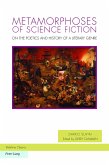This volume incorporates Darko Suvin's thinking on utopian horizons in fiction and on eutopian and dystopian readings of historical reality since the 1970s. While the focus is on the United States and the United Kingdom, the essays also draw on French, German and Russian sources. The book is composed of eighteen chapters, including four sets of poems. The chapters include heretic reflections on utopian fiction, science fiction and utopian studies, explorations of dystopias, and epistemological examinations of political standpoint. Throughout, plebeian history is the stance from which all the author's value judgements are made. The essays and poems engage with the empirical world and identify areas of hope. In a dark dystopian time, they reaffirm eutopia, the radically better place to be striven for in every here and now.
«We have been waiting for years for this comprehensive statement on Utopia from the most innovative contemporary theorist of this form. A comparatist with a remarkable sweep from Japan and Eastern Europe to the US and Canada, a theater specialist and dramaturg with an emphasis on Brecht, a poet, and a critic of science fiction, whose knowledge of that body of writing ranges from its classics and earliest anticipations to the present, Darko Suvin grasps the form of Utopia in its fundamental social, political, and cultural consequences. This book constitutes an indispensable provocation and a stimulating resource.» (Fredric Jameson, Duke University, author of 'Archaeologies of the Future: The Desire Called Utopia and Other Science Fictions')
«Suvin's book says what no one else is saying in quite this way. Individual chapters - like the ones on Disneyland, salvation, or collectivism - include some of the sharpest analyses of our current reality, and taken together they form an impressive diagnostic. This is a very important achievement in the midst of our general confusion. Establishing the frame necessary for a potential future praxis, Suvin's book is itself a utopian work couched in the form of socioeconomic and literary criticism, always reminding us of a potential human greatness now mostly wasted. And the poems are beautiful, moving, and deep.» (Kim Stanley Robinson, author of the 'Mars Trilogy' and 'Years of Rice and Salt')
«If you, as I, wondered what science fiction had to do with all the complex travails of the world left over the past century, then you too may be transported by the poetic political vision of Darko Suvin. It is a journey worth taking.» (Immanuel Wallerstein, Yale University, author of 'Historical Capitalism with Capitalist Civilization and Utopistics')
«Ohne jede Übertreibung kann man sagen: Will man phantastische Literatur betrachten, kommt man an Darko Suvin nicht vorbei.» (Johannes Rüster, Inklings-Jahrbuch 29, 2011)
«Suvin's book says what no one else is saying in quite this way. Individual chapters - like the ones on Disneyland, salvation, or collectivism - include some of the sharpest analyses of our current reality, and taken together they form an impressive diagnostic. This is a very important achievement in the midst of our general confusion. Establishing the frame necessary for a potential future praxis, Suvin's book is itself a utopian work couched in the form of socioeconomic and literary criticism, always reminding us of a potential human greatness now mostly wasted. And the poems are beautiful, moving, and deep.» (Kim Stanley Robinson, author of the 'Mars Trilogy' and 'Years of Rice and Salt')
«If you, as I, wondered what science fiction had to do with all the complex travails of the world left over the past century, then you too may be transported by the poetic political vision of Darko Suvin. It is a journey worth taking.» (Immanuel Wallerstein, Yale University, author of 'Historical Capitalism with Capitalist Civilization and Utopistics')
«Ohne jede Übertreibung kann man sagen: Will man phantastische Literatur betrachten, kommt man an Darko Suvin nicht vorbei.» (Johannes Rüster, Inklings-Jahrbuch 29, 2011)









